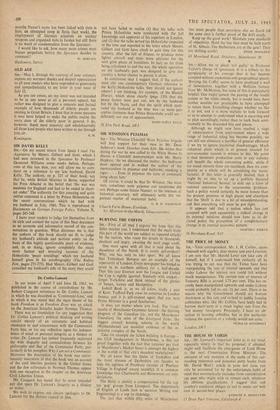SIR DAVID KELLY SIR,—On my recent return from Spain I
read The A ppeasers, by Messrs. Gilbert and Gott, which I had seen reviewed in the Spectator by Professor Desmond Williams some weeks before. Perhaps, even at this late date, you will allow me to com- ment on a reference to my late husband, David Kelly. The authors, on p. 327 of their book, say that he, while British Minister in Berne, supported his Press Attaché in the belief that 'the war was madness for England and had to be ended in short- est order.' The authority for this amazing and quite untrue statement is a letter by Prince Hohenlohe on the secret conversations which he had with my husband in July, 1940. This is reproduced in Documents on German Foreign Policy, Volume X, pages 245-248.
I leave your readers to judge for themselves from its style and content the value of this Nazi document as an accurate and informative, record of the con- versations in question. What distresses me is that the authors of this book should see fit to judge my husband's attitude and motives solely on the basis of this highly questionable piece of evidence, and, in so doing, ignore completely the much more factual and revealing account of the Hohenlohe 'peace soundings' which my husband himself gives in his autobiography (The Ruling Few, pages 271-275). Had Messrs. Gilbert and Gott consulted my husband's side of the story they could not have failed to realise (1) that his talks with Prince Hohenlohe were conducted with the full knowledge and approval of his superiors in London, and (2) that the talks served (as Hohenlohe suspected at the time and reported in the letter which Messrs. Gilbert and Gott have cited) to gain lime for this country, after the fall of France, to produce more fighter aircraft and train more aircrews for the next grim phase of hostilities. In fact, so far from being calculated to end the war, the whole operation on my husband's part was designed to give this country a better chance to pursue it alone.
In conclusion may I suggest that, if the authors must cite one contemporary German reference to the Kelly/Hohenlohe talks, they should not ignore others? I am thinking, for example, of the Hassell Diaries, which show clearly (page 135) that the peace feelers were put out, not by my husband but by the Nazis, and that the spirit which moti- vated my husband at the time was—as more per- ceptive Germans than Prince Hohenlohe could see— definitely not one of appeasement.






































 Previous page
Previous page